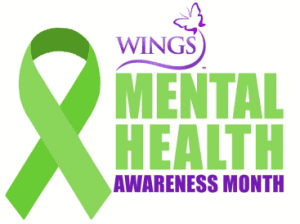May is Mental Health Awareness Month; 3 Myths and 6 Tips About Mental Health
- Posted by Sarah Swiston
- On April 29, 2024
- Chicago, chicago metropolitan area, Chicago suburbs, Domestic Violence, domestic violence organization, dv survivors, mental health, Mental Health Awareness Month, mental health domestic violence, mental health DV, mental health tips, mental illness, mental illness myths, WINGS, WINGS Program
Did you know that mental health and domestic violence are often intertwined? The trauma caused from domestic abuse puts survivors at risk for developing mental health conditions including depression, anxiety and PTSD. Also, mental illness may increase a person’s vulnerability to abuse. Learn about 3 mental illness myths and 6 tips to improve your own mental health and well-being.
Since the pandemic began, WINGS has seen increased levels of trauma. Of 46 counseling case files FY23, 72% reported positive screens on at least one behavioral health concern including mental illness, suicidal/homicidal ideation and/or substance abuse. Since clients self-report this information, actual instances may be higher as clients tend to underreport.
Help is available.
WINGS has a counseling line available for domestic violence survivors: http://wingsprogram.com/counseling-planning/ or call WINGS counseling intake line: (847) 519-7828. The Intake Line is answered by trained crisis workers Monday-Friday, 9am-5pm. If you should call outside of these hours, please leave a message and a worker will return your call the next business day.
Mental Health and Domestic Violence:
Mental Health conditions are found at higher rates with domestic violence survivors. Often internalizing verbal abuse from their partner, they may blame themselves for their situation. So on top of the fear they may be experiencing, they may also feel anger and resentment toward themselves. Long-term abuse can lead to compulsive behaviors, self-destruction or suicide.
- Posttraumatic Stress Disorder:
One national CDC study found that 80% of women who experience rape, stalking or physical violence by an intimate partner report significant short or long-term PTSD.
- Depression:
Survivors of domestic violence have nearly double the risk for developing depressive symptoms and three times the risk for developing a major depressive disorder.
- Self-Harm:
Women exposed to domestic violence are up to three times more likely to engage in deliberate self-harm than non-abused women.
- Suicidality:
Women who reported partner violence at least once in their lifetime are nearly three times as likely to have suicidal thoughts and nearly four times as likely to attempt suicide compared to women who have not been abused by a partner.
- Anxiety Disorders:
Survivors have a nearly three times greater risk of having an anxiety disorder diagnosis.
- Substance Abuse:
One 2009 study from the Archives of Internal Medicine suggests that survivors are nearly six times as likely to have a substance use disorder as compared to those who have never been abused.
Mental Illness Myths
 One in four people in the world will be affected by a mental or neurological disorder at some point in their lives according to the World Health Organization (WHO). Despite this prevalence, research shows that mental illness is still stigmatized. This negative view of mental illnesses causes people to not seek treatment that could make their condition more manageable. Below are some myths about Mental Illnesses:
One in four people in the world will be affected by a mental or neurological disorder at some point in their lives according to the World Health Organization (WHO). Despite this prevalence, research shows that mental illness is still stigmatized. This negative view of mental illnesses causes people to not seek treatment that could make their condition more manageable. Below are some myths about Mental Illnesses:
Myth #1: People with mental illnesses are fragile and any direct, honest feedback you give them will upset them intensely.
Direct feedback might be painful, but is often appreciated and honesty builds trust.
Myth #2: People with mental illnesses are “out of touch” with reality.
The ability to cope is relative and what some people may see as a “crazy behavior” are actually choices a person has made to protect themselves. Labeling someone as “out of touch” allows us to distance ourselves from each other and pass judgement. However, a separate reality may be self-protective for the person experiencing mental illness.
Myth #3: Once a person is crazy, they will never change. If they do change, the craziness can return at any moment. Their situation is hopeless and endless.
Behaviors that lead to someone making seemingly irrational decisions may be a response to an oppressive environment. It is important for a person’s healing to find the root cause.
Humans have incredible potential to change. Some people may still experience mental health symptoms when they are working toward recovery. Treatment and the genuine support from others may help, but recovery is a personal journey.
Mental Health Tips
Mental health impacts how we think, feel, make decisions and relate to others. Self-care can play a major role in maintaining or improving your mental health. Taking care of yourself is not selfish. If you are not well mentally or physically, you may not be able to take care of others to the fullest.
- Practice Kindness: Take Time to show some kindness to yourself and others. Benefits of kindness include:
- Improving your mood and increasing your self-esteem
- Decreasing your blood pressure
- Boosting serotonin and dopamine to cause feelings of satisfaction
- Releasing endorphins
- Enhancing feelings of connectedness
 Physical Care: Stretch or get a massage. Benefits of stretching include:
Physical Care: Stretch or get a massage. Benefits of stretching include:
- Increasing serotonin levels which helps to stabilize your mood
- Increasing blood flow
- Improving posture
- Enable your muscles to work more effectively and joints to move through their full range of motion
- Get Outdoors. Benefits include:
- Meditate. Benefits include:
- Gaining a new perspective
- Increasing self-awareness
- Focusing on the present
- Reducing negative emotions
- Increasing creativity
- Lowering resting heart rate and blood pressure
- Improving sleep quality
- Try Grounding Techniques. Examples include:
- Put your hands in water and focus on the water’s temperature and feel on your hands.
- Breathe Deeply
- Take a short walk and concentrate on your steps
- Savor a scent
- List your three favorite things in several categories like foods, songs, places, etc.
- Visualize your favorite place and how you felt the last time you were there
- Plan an activity and focus on the details
To learn more about Counseling and/or Mentoring, call WINGS Intake Line: (847) 519-7828
The Intake Line is answered by trained crisis workers. Please leave a message and a worker will return your call within
24-48 hours.




0 Comments